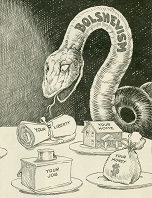
|
Missouri Pacific Lines Magazine |
|
Edited by Edward Harlan
"E.H." McReynolds, |
Edward Harlan "E.H." McReynolds (1890-1937) was an early Missouri newspaperman who
rose to become a prominent public relations and advertising executive with the
Missouri Pacific Lines railroad in St. Louis in the 1920s and '30s.
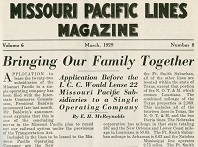
During his
years with the Missouri Pacific, from 1923 to 1937, he served as editor of the Missouri
Pacific Lines Magazine, chronicling the people, places and events of the
growing company. His name graced the masthead of each and every issue.
The magazine was a substantial production of work, sometimes totaling as many as 88 pages. It carried advocacy opinion pieces about the industry as well as articles about the company's financial performance, operations and personnel. Included were reports from its individual sections, from St. Louis, Kansas City and Omaha to Memphis and Houston, and many smaller towns in between.
The first edition was produced in July 1923. Inside the front cover was a message to all employees: “The Missouri Pacific Magazine is yours! We need your help to make it the best of its kind in America… We want lots of pictures!” It included a letter to all employees by new President L.W. Baldwin and a history of the railroad by Edward J. White.
Then in the November 1924 edition, on the magazine's back cover, Baldwin authored an essay explaining the greater good that the company's public relations and publishing were accomplishing. Under the headline "Missouri Pacific Railroad 'Open Door' Policy Is Helping to Bring About Better Understanding of Railroad Question," he wrote:
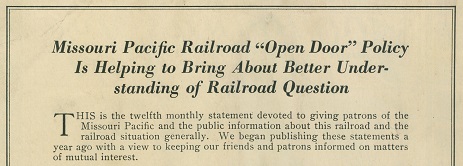 |
| Back cover essay by President Baldwin, November 1924 edition |
This is the twelfth monthly statement devoted to giving patrons of the Missouri Pacific and the public information about this railroad and the railroad situation generally. We began publishing these statements a year ago with a view to keeping our friends and patrons informed on matters of mutual interest.
These statements have been prepared with a view to clearing away any alleged mystery which might be supposed to surround the railroads or the Missouri Pacific. We have discussed frankly the questions of service, rates, the Transportation Act, railroad credits, the relationship between the railroads and the farmers, volume of traffic, progress being made in improving the railroad situation, taxes, dividends, the necessity for practicing Safety First, advice to shippers regarding co-operation in increasing average car loadings, requests for co-operation in prompt release of equipment, and discussions of the cost of equipment and other items that enter into the production of adequate and dependable service.
Railroads have made mistakes in the past by failing to take the public fully into their confidence and the public has made mistakes by demanding the wrong kind of railroad regulation and service that was impossible to render under the circumstances. We feel that this condition is being corrected through the medium of these statements, supplemented, of course, by the highest character of service we are able to provide.
We know that the feeling toward the Missouri Pacific is more friendly today than it ever has been in the past. We are proud of that. We believe the principal reason is that the public knows more about the Missouri Pacific and on our part we are constantly striving to keep in close touch with our patrons and keep advised as to what they want.
We believe the citizens in the territory served by the Missouri Pacific are fully alive to the advantages they obtain and enjoy through constructive treatment of the railroads as compared with the disadvantages all must suffer as a result of unconstructive regulation. We realize, and we want the public to know that we realize, that our duty is to provide an adequate and satisfactory service, and that we must contribute our full share to the upbuilding, the progress and the prosperity of the territory we serve and have a fair profit for the benefit of the security owners in the property, and we have an abiding faith in the fairness of the American people and the communities we serve to work with us to these purposes.
Political cartoon, 1923
We believe that we would be unfair to our friends and ourselves if we failed to keep the public informed on the matter. After a year of activity along this line we are convinced that our patron and friends understand and appreciate what we are trying accomplish. I solicit your co-operation and suggestions.
Included over the years were pieces on charitable organizations such as the Boy Scouts and apple blossom festival organized by the Missouri River Apple Growers. The railroad's booster clubs all along the rail lines contributed articles, and there were numerous photographs of employee sports teams, children's photos and various special interest groups. Stories promoted safety, chess tips and an honor roll of deceased employees. The inaugural issue also contained a political cartoon showing a snake -- labeled "Bolshevism" -- threatening "your liberty" - "your home" - "your job" - "your money."
One article in the February 1927 edition included a recap of a banquet held at the American Annex Hotel, featuring remarks from world heavyweight boxing champion Gene Tunney. McReynolds was master of ceremonies for the event and "declared it was McReynolds who first gave him the idea that he would eventually be able to beat [Jack] Dempsey," said the article. "Tunneu also explained that his principal reason for accepting the Boosters' invitation was that he began his career as a rate clerk on an eastern railroad and that when, as a United STates Marine in France at the close of the World War, and while taking part in the tournaments which ultimately brought him the light heavy-weight boxing title of the [American Expeditionary Force], he became the friend of another Marine [McReynolds]."
Unlike corporate magazines of today, the publication carried third-party advertising targeting the MOPAC's thousands of employees. The June 1929 edition, for example, contained advertisements from Illinois Watch, Chrysler Motors, Edgeworth Tobacco and International Correspondence Schools.
Occasionally, McReynolds himself would write by-lined pieces about major corporate developments. In March 1929, for example, he authored "Bringing Our Family Together: Application Before the I.C.C. Would Lease 22 Missouri Pacific Subsidiaries to a Single Operating Company."
This page provides a summary of the original editions of the magazine preserved today in the Minerd.com Archives.
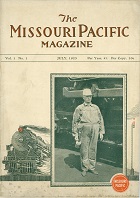 |
 |
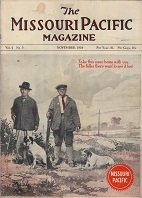 |
| July 1923 | June 1924 | November 1924 |
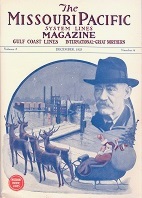 |
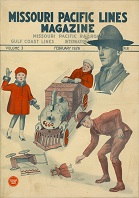 |
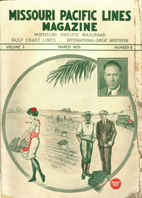 |
| December 1925 | February 1926 | March 1926 |
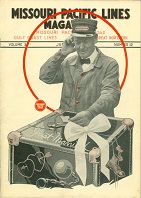 |
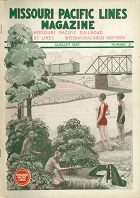 |
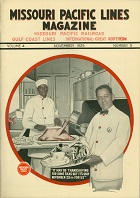 |
| June 1926 | August 1926 | November 1926 |
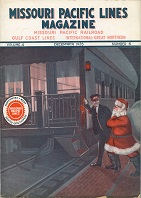 |
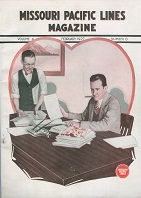 |
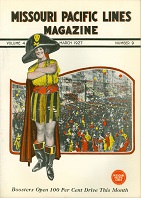 |
| December 1926 | February 1927 | March 1927 |
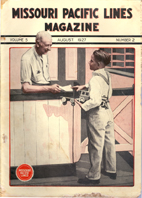 |
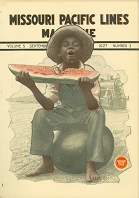 |
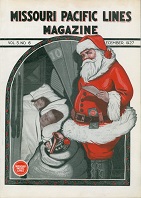 |
| August 1927 | September 1927 | December 1927 |
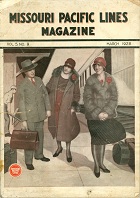 |
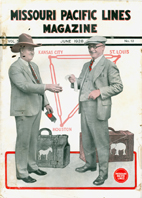 |
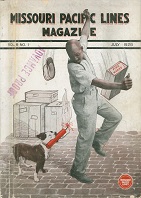 |
| March 1928 | June 1928 | July 1928 |
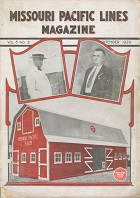 |
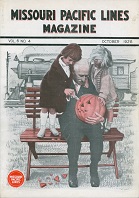 |
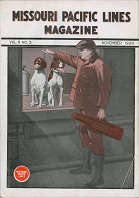 |
| September 1928 | October 1928 | November 1928 |
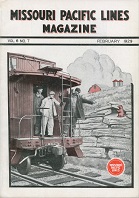 |
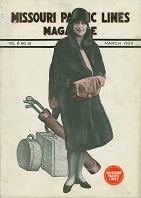 |
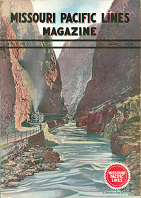 |
| February 1929 | March 1929 | April 1929 |
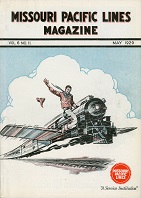 |
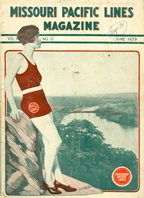 |
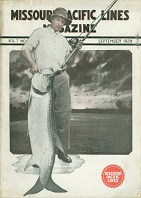 |
| May 1929 | June 1929 | September 1929 |
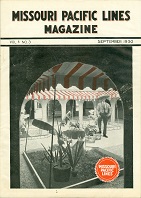 |
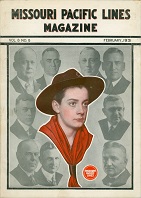 |
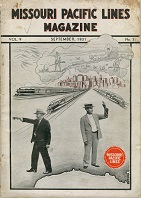 |
| September 1930 | February 1931 | September 1931 |
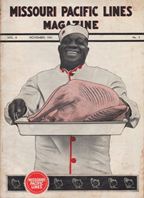 |
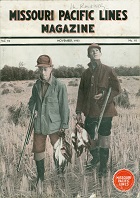 |
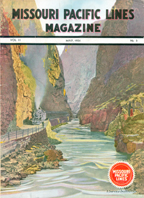 |
| November 1931 | November 1933 | May 1934 |
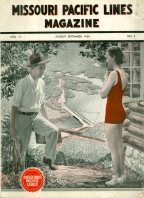 |
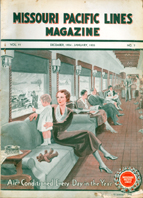 |
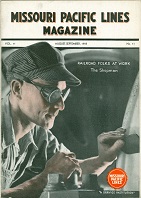 |
| Aug.-Sept. 1934 | Dec. 1934-Jan. 1935 | Aug.-Sept. 1935 |
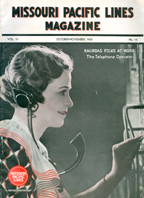 |
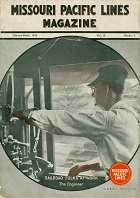 |
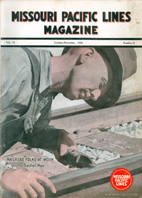 |
| Oct.-Nov. 1935 | Feb.-March 1936 | Oct.-Nov. 1936 |
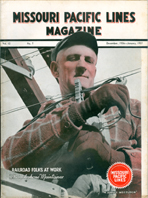 |
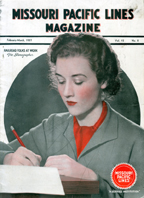 |
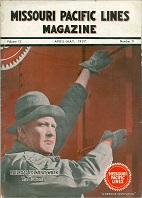 |
| Dec. 1936-Jan. 1937 | Feb.-March 1937 | April-May 1937 |
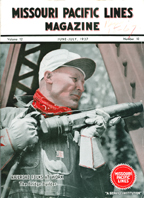 |
||
| June-July 1937 |
|
Copyright © 2010-2025 Mark A. Miner |
|
March 1928 issue courtesy of Lillian Moffeit and Barbara Boren |
